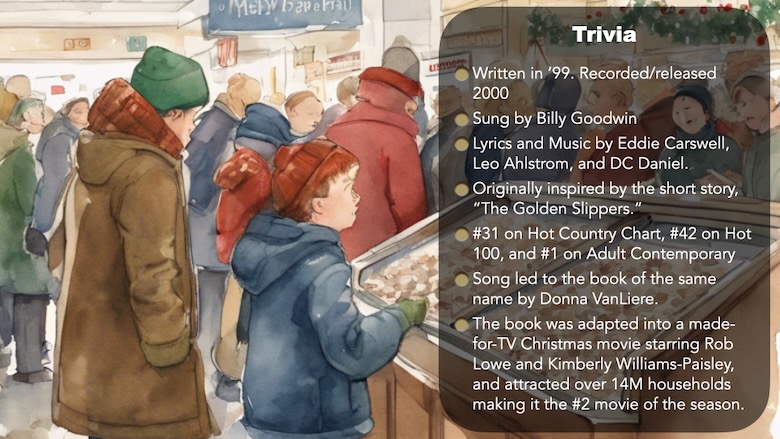
“The Christmas Shoes” is often decried for being manipulative or pulling on our emotional heartstrings like Hulk yanking down a helicopter. It was even voted “The Worst Christmas Song Ever” on Jezebel.com.
I believe we’re missing the message of the song and the intent of the writers. Let’s look at this 2000 #1 hit song from two different perspectives: the boy’s and the narrator’s. I’ve even invited my friend, one of the co-writers of the song, Leo Ahlstrom, along for the conversation.
Article 2 of 4 in the series.
“Little Drummer Boy” | “The Christmas Shoes” | “Mary, Did You Know?” | “I’ll Be Home for Christmas”
Perspective: The Boy
Critics have called the song “poverty porn.” Others have accused the writers and performers of showing God as a mean and vindictive tyrant killing off a little boy’s mom just to thaw the narrator’s heart.
Once again—just like in “Little Drummer Boy”—critics brought their literal toolboxes to a poem set to music.
Let’s ask a different literal question and bring it to the poem: If you were a young boy who was watching his mom die, how would you behave at Christmas?
The Power of Grief
Everyone here on earth will die. Probability suggests that you’ve already lost someone very close to you. During my interview, co-writer and current worship pastor at Rolling Hills Community Church Leo Ahlstrom said, “It’s going to hit us all because we’re all going to pass away. Our moms or dads are all going to pass away. We all have an expiration date, so to speak.”
Therefore, it’s inevitable that we’re going to suffer the pain the little boy did.
Who is the closest friend or family member you’ve mourned?
Grief makes us behave in strange ways. We behave even more strangely when we experience prolonged anticipatory grief, like caring for a parent who finally succumbs after a long illness or passes after years lost in a fog of dementia.
We often point to the stages of grief and wonder where we are in the process developed by Elisabeth Kübler-Ross: denial, anger, bargaining, depression, and acceptance. There’s a problem, however, Dr. Kübler-Ross didn’t write about a process or stages. She wrote about the realities of grief that those mourning experience. She never intended any particular order and believes that we may go through some stages multiple times before learning to live in the light of guilt.
I lost my father, best friend, father-in-law, mother, and two jobs within three years. I was so deep in grief I checked out of my life. I grew distant from everyone around me. Through the grace of good friends and a long-suffering therapist, I was able to move through grief.
To me, grief is more like a dark, dense forest. At a great distance, you can see light, but as you move through, you trip over roots and run into trees. During my trek, I ran into trees of bargaining, tree after tree of anger, and became wrapped up in the limbs of the tree of depression.
To me, the little boy is merely trying to make his own way through his forest of grief? Could you or I do any differently?
The Ahlstroms’ Journey of Grief

Ahlstrom has been up close and personal with grief following the success and popularity of the song. He lost his mother to Alzheimer’s and then on June 14, 2009, his 25-year-old daughter Meagan was killed in an auto accident caused by a drunk driver. When the song was released, she was 16. She loved the song and loved shoes. After her death, a family member sent them a Christmas ornament of miniature high heeled shoes. He and his wife Rebecca began collecting more shoe ornaments. The idea of “Christmas Shoes” took on new meaning for them.
“When Rebecca posted about the shoe tree on Facebook, all of a sudden, shoes started coming from all over the world, including different places where we had visited on mission trips.” Ahlstrom commented, “We now have hundreds of these Christmas shoes. They’re on our tree this year. They’ll always be on our tree.”
Psychologist and feelings expert Chip Dodd wrote, “Sadness is proportional—the more sadness you feel after a loss, the more you value what is lost.”
When my father was slowly suffocating due to pulmonary fibrosis, I decided that I was going to fulfill my dad’s dream of visiting the Baseball Hall of Fame in Cooperstown, New York. By this time in the progression of this disease with no known cause and no known cure, a cannula blew oxygen into his nose 24 hours a day. He had alread made the decision to not leave the house except for medical needs. The trip, though, was all I could talk about with friends. I tried to figure out which RV would be the most comfortable, how many oxygen tanks we would need, how to make him comfortable, what special provisions we would need at the Hall, and more. I talked on the phone with Dad about it every time we connected. My dad graciously said, “Son, I just don’t think I can take the trip. Thanks for all your work.” I finally let it go. This trip was my panicked journey to the store to buy a pair of shoes.
How do you honor those you grieve?
 Perspective: The Narrator
Perspective: The Narrator
In downtown areas, thousands walk past homeless men and women without a thought or a glance. Some may be repulsed and walk, like those who ignored the “man in the ditch”, cross over to the other side of the street. Some scoff at those who hold cardboard signs in shopping center parking lots. Others recoil when approached with a story of hunger or running out of gas.
We read this story and we long to be like the Samaritan but we wonder inside if we are more like the Levite or the priest. Read the words of Jesus again.
“A man was going down from Jerusalem to Jericho,
and he fell among robbers, who stripped him and beat him and departed,
leaving him half dead. Now by chance a priest was going down that road,
and when he saw him he passed by on the other side.
So likewise a Levite, when he came to the place and saw him,
passed by on the other side. But a Samaritan, as he journeyed,
came to where he was, and when he saw him, he had compassion.
He went to him and bound up his wounds, pouring on oil and wine.
Then he set him on his own animal and brought him to an inn and took care of him.
And the next day he took out two denarii and gave them to the innkeeper, saying,
‘Take care of him, and whatever more you spend, I will repay you when I come back.’”
In essence, the narrator is merely the Samaritan in the story. The priest is the key leader of his own congregation. The Levite is the worship leader. They both passed by. The Samaritan helped. As you may have heard, this is significant because Jews and Samaritans were at odds and didn’t like each other. Yet the Samaritan helped.
In the song, the narrator’s heart thaws. What will it take for yours to thaw?
Ahlstrom believes those who bash the narrator (or the song) should listen more carefully. He said, “Before the guy in the story has any kind of epiphany about what Christmas really is or what it means, he helps. He sees this little boy, and then he helps. Then after that—after the shoes are purchased and the kid runs out— that’s when he has his realization.”
Ahlstrom has seen this over and over again in the lives of those he ministers to or even in his own life. “We have no idea,” he said, “the impact that God might bring about when we serve the person in front of us. We just don’t know. Then God works. It is His kindness that draws us to repentance.”
My question to the critics of this song: when was the last time you helped? What did God do for you?
Ahlstrom continues to hear dozens of stories every Christmas about what the song means to fans. One night at a church volleyball game, one of the other players, a burly man who works in HVAC, showed up on the sidelines late. He elbowed Leo while wiping away tears and said, “Sorry I’m late, I had to finish listening to ‘Christmas Shoes.’”
“As a songwriter, my job is to evoke emotion.” Ahlstrom continued, “We are trying to tap into what connects to us and what connects us with others? When we listen to a song, we determine our connection in the first few seconds… even before we’ve heard a lyric. To me, that’s the mystery of music. And life.”
Every great story follows the character who is transformed by the experience. The song follows the narrator on his hero’s quest.
- He is thrust into a world he doesn’t want to be in (in line at a store).
- He is presented with a decision (help or not).
- He is surrounded by others who challenge the status quo (the cashier, impatient customers, and the boy.)
- He comes to the mouth of the cave (should he help or push the boy away).
- He dies; in this case, he dies to self (death).
- And then he goes through catharsis (“caught a glimpse of heaven’s love”)
My Moment of Mystery with the Song
In one of the early years following the release of the song, I always made a point to turn up the radio when it came on. We’d listen as a family and sing along. One year, after we’d heard the song many times, it came on the radio right as we pulled into our destination. I was about to turn off the engine when my son began singing the song full-throated. It surprised us all. We turned to watch him deliver the song full of emotion and sincerity. When the song ended, I was like the narrator. I had seen a “glimpse of heaven’s love.” I don’t know what prompted him to feel the song so deeply. We supposed it was his realization he was around the age of the boy in the song. Nevertheless, that moment in a minivan changed the song forever for me.
Are You the Narrator or the Boy?
This Christmas, who do you need to be more like: the narrator or the boy? Do you need to give yourself freedom to experience grief because “Christmas Hits Different This Year”? Or do you need to be the narrator and go on your own journey to see others, yourself, and Christmas in a different light?
Listen to the song with fresh ears and eyes:
If you’re so inclined, please share your perspective in the comments below.
Links to information mentioned in the article:
- Rolling Hills Community Church
- Donna Vanliere’s eleven-book series based on the original song can be found wherever you buy books: Start with The Christmas Shoes.
- In 2023, “The Christmas Shoes” movie based on the Vanliere book (starring Rob Lowe and Kimberly Williams-Paisley) can be purchased or rented on paid streaming platforms.













